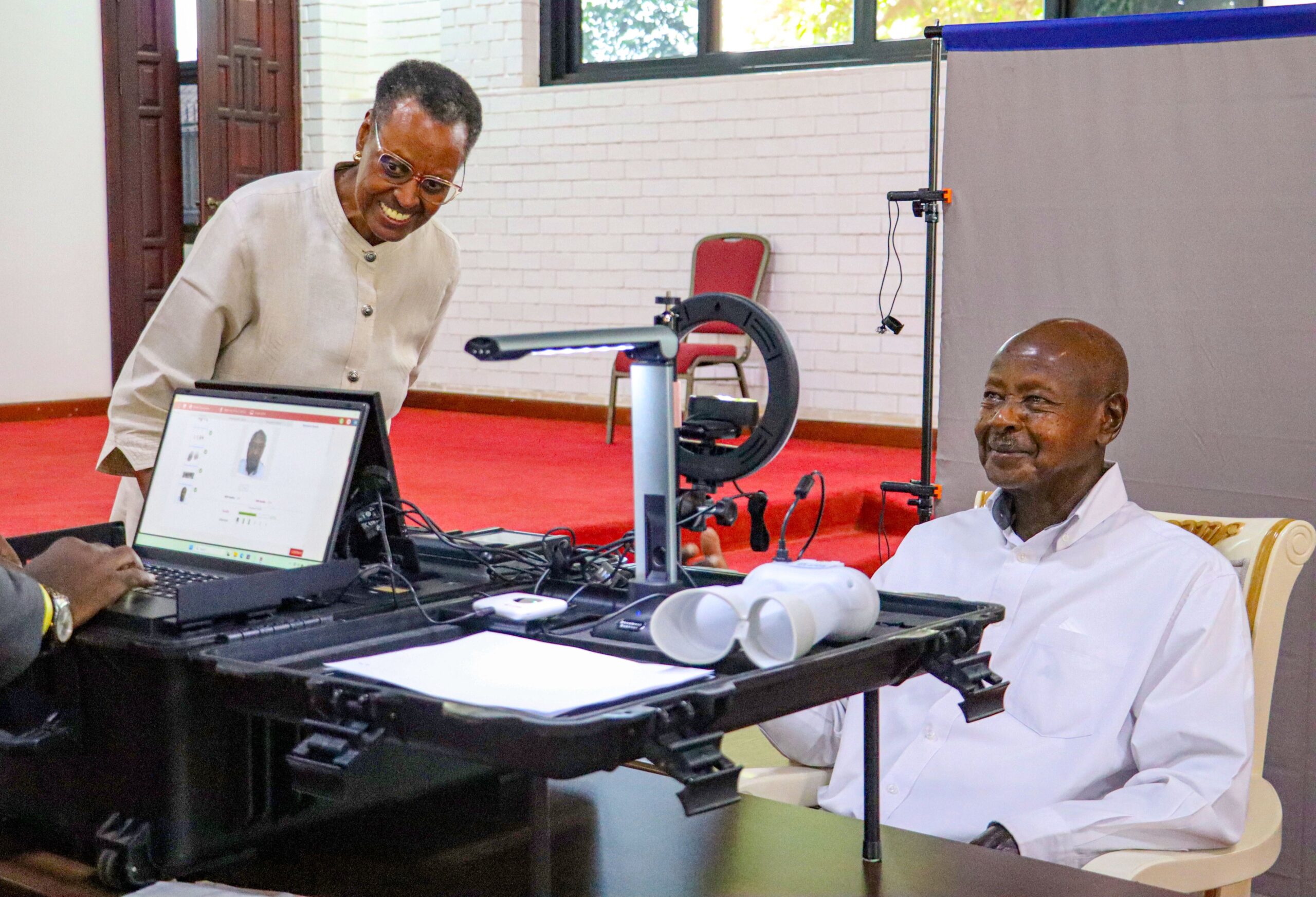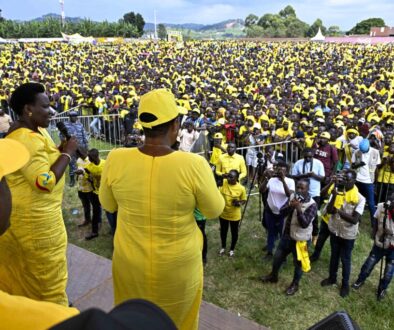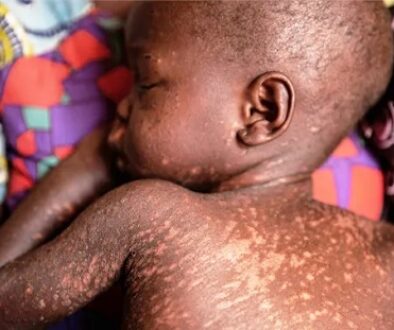Museveni, First Lady renew national identity cards

CAPTION: President Museveni, (R) with the First Lady Janet Museveni, (L) participated in the mass registration and renewal exercise of the National Identity cards at State Lodge, Nakasero June 6th, 2025. (Courtesy photo).
By Stephen Wandera Ouma
NAKASERO – President Yoweri Kaguta Museveni and the First Lady also Minister of Education and Sports, Maama Janet Museveni have this afternoon participated in the ongoing mass registration and renewal exercise of the National Identity cards at State Lodge, Nakasero.
The project is being implemented by the National Identification and Registration Authority (NIRA) and the renewal exercise was efficiently conducted by a team from the authority, led by the Executive Director, Ms. Rosemary Kisembo.
The registration of citizens is regarded as a crucial component of national security, ensuring that every individual is accounted for within the nation’s identity framework. Enhanced biometric
technology associated with these ID cards provides a reliable and unalterable means of establishing identity.
This initiative underscores the government’s commitment to strengthening national identity systems and fostering socio- economic transformation.
Meanwhile Ugandans have flocked to various centres across the country to renew their national identity cards. The National Identification and Registration Authority (Nira) launched a countrywide mass enrolment and renewal exercise, which is expected to run for six to 10 months.
In Adjumani District, some local leaders raised concerns about the registration of refugees living in the area. They pointed out that refugee settlements in the district are home to various tribes such as the Madi, Kuku, and Acholi who also have ethnic relatives among Ugandan citizens. Adjumani District Chairperson Ben Anyama warned that the close cultural and language ties between communities in Uganda and South Sudan could make the registration process more difficult.
“We are dealing with refugees who are Madi, Kuku, Kakwa, and Acholi—tribes that are also constitutionally recognised in Uganda. This similarity might make it difficult for officials to distinguish between citizens and refugees, which could lead to misidentification or even fraud,” he explained. Adjumani District currently hosts about 244,374 refugees, according to the 2024 UNHCR statistics.
Mr Justine Drileonzi, a resident of Adjumani Town, expressed relief and excitement about replacing his lost ID. “This exercise is long overdue. I lost my ID some time ago, but I have picked up the form and will get a police letter so that I can finally get a new ID free of charge,” he said.
The Nira District Registration Officer, Mr Fred Balaba, emphasised the importance of the exercise, especially for citizens with expired IDs and those registering for the first time.
“To prevent non-citizens and refugees from being mistakenly registered, we have implemented stringent security measures. First-time applicants must present an LC1 letter with details about their parents’ names, tribe, and clan, and this must be endorsed by the District Internal Security Officer (DISO). We believe this will help us effectively screen out non-citizens,” Mr Balaba said.
The Koboko District Information and Technology Officer, Mr Gerald Mukama, said the exercise was delayed because there weren’t enough staff to carry it out.
“Being located at the border of Uganda, DRC and South Sudan, there will be thorough screening of people before their data can be captured because the South Sudanese and Congolese would want to come and register also,” he said. According to records from the first registration exercise carried out in 2016, Nira captured data from 88,878 people in the district, but only 66,000 residents received their IDs. Nira also reports that out of Koboko’s total population of 271,781, only 217,525 people have been registered in their system.
In Arua City, West Nile, dozens of residents were seen lining up early in the morning at the Nira offices to take part in the exercise.
Ms Salima Avako, a resident of Upper Bibbia Cell in Arua Central Division, said: “I have spent about two hours here, but got discouraged because I had other work to do.I will return another day when I am free. With the long lines, people will spend a lot of time here.” She called for more registration centres to be opened to reduce overcrowding.
Meanwhile, the Tororo Resident District Commissioner, Mr Sadiq Bategena Bakale, warned Nira officials not to ask citizens for bribes.
“We are aware of what I’m talking about, but because of the love we have for our country, I take this opportunity to warn you against asking Ugandans to pay for this service because it might lock out those coming from economically less advantaged backgrounds, yet the document is very important,” he said during the launch of the exercise in the district.
He also warned security officers and village Local Council chairpersons not to recommend non-citizens for registration during the exercise. He said that since Tororo is located at the border with Kenya, some local leaders might be tempted to take bribes to help non-citizens get Ugandan national IDs—something he warned could compromise the country’s sovereignty.
Mr Bategena claimed that a survey shows more Kenyans than Ugandans currently hold Ugandan national IDs.
“I hear that some of the Kenyans here are landlords, even the residents fear pointing at them as non-citizens, which may ease their illegal acquisition of citizenship. However, its my appeal to you, the village leaders and internal security officers, to thoroughly verify that those people registered at the parish level are Ugandans,’’ he said. Mr John Okeya, the Tororo District chairperson, urged Nira officials to collect accurate data.
He pointed out that previously, citizens’ details were recorded incorrectly, which later caused problems for them when trying to access public services.
‘’We have had issues with older persons whose biodata was misrepresented, and this has made it difficult for them to access the Social Action Grant for Elderly persons. So, we don’t want to repeat the same mistakes,’’ Mr John Okeya said.
The Nira Tororo Area Manager, Ms Hilda Nambozo, said they received enough materials to carry out the exercise and encouraged Ugandans to take part. She revealed that the district was given 75 biometric digital kits, which she said are enough to serve the whole area.
She added that registration officers will be stationed at parish level, and if necessary, they will move deeper into the villages to reach more people. In Kabale District, the Nira officer in charge, Mr Billy Basulwa, said they began by registering Uganda People’s Defence Forces personnel, police officers, and other essential workers who will be helping with the mass registration exercise.
“We are officially launching the exercise on Wednesday [today] at the Kabale District headquarters, where key stakeholders such as religious leaders have been invited,” Mr Basulwa said. He added that a district coordination committee would soon be formed to create a roadmap for the exercise.
The Masaka City Resident City Commissioner, Mr Ahmada Wasaki, said due to long queues, some impatient citizens are trying to bribe Nira staff to be registered ahead of others. “Please don’t accept bribes because it will put your work at risk, let those in line wait until it is their turn to get registered,” Mr Wasaki added.
Mr Silvester Ogwade, the assistant registration officer for Soroti District and city, said his team is facing challenges in transporting the kits because they have only one vehicle serving both the city and the district. “As I talk now, Gweri has not yet received the kits waiting for the same vehicle to take them,” Mr Ogwade complained.
He added that poor internet connectivity is also making their work difficult.
Meanwhile, in Mbarara City, the exercise began with a low turnout in some areas, and residents are calling for more public awareness and sensitisation. “Like many other government programmes, there is little sensitisation about this exercise. We know getting an identity card is very important so the communities need more awareness so they do not miss out,” Mr Ambrose Mbaine, a resident of Andrews, Kakiika in Mbaraa City North, noted.
Mr Edgar Turyakira, the Nira western regional manager, said some citizens skipped the first day of the exercise, knowing that it will run for several months.
“We still have time, the only challenge we have is electricity, the computers we have use electricity and most centres in Mbarara City do not have electricity, but we will do our best to see exercise is successful and Ugandans are served,” he explained.
About the ID registration
Ugandans who want to correct details on their national ID cards, such as name changes, will have to pay a fee of Shs200,000—unless the mistake was made by Nira.
Nira plans to renew 15.8 million national ID cards that will expire by June 2025. It also aims to register 17.2 million new applicants, including children under 17 and those who missed earlier registration exercises.
The entire mass enrollment and ID renewal process is expected to cost taxpayers around Shs666.85 billion. Out of this, Shs183 billion will go toward producing new ID cards, Shs293 billion will be used for technology like data centres and biometric kits, and Shs190.85 billion will pay the 13,864 workers involved in the exercise.


